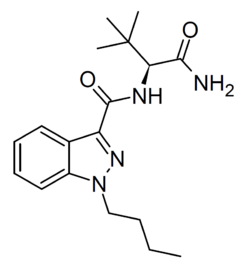Chemistry:ADB-BUTINACA
From HandWiki
Short description: Chemical compound
 | |
| Legal status | |
|---|---|
| Legal status |
|
| Identifiers | |
| |
| CAS Number | |
| PubChem CID | |
| ChemSpider | |
| UNII | |
| ChEMBL | |
| Chemical and physical data | |
| Formula | C18H26N4O2 |
| Molar mass | 330.432 g·mol−1 |
| 3D model (JSmol) | |
| |
| |
ADB-BUTINACA (ADMB-BINACA[2]) is a synthetic cannabinoid compound which has been sold as a designer drug.[3][4][5][6][7] It is a potent CB1 agonist, with a binding affinity of 0.29nM for CB1 and 0.91nM for CB2, and an EC50 of 6.36 nM for CB1.[8][9][10][11][12][13][14]
See also
References
- ↑ "Substance Details ADB-BUTINACA". https://www.unodc.org/LSS/Substance/Details/d1934790-552e-4810-b1a1-e99cd3991c49.
- ↑ Pulver, Benedikt; Fischmann, Svenja; Gallegos, Ana; Christie, Rachel (March 2023). "EMCDDA framework and practical guidance for naming synthetic cannabinoids". Drug Testing and Analysis 15 (3): 255–276. doi:10.1002/dta.3403.
- ↑ "Detection of ADB-BUTINACA Metabolites in Human Urine, Blood, Kidney and Liver". Journal of Analytical Toxicology 46 (6): 641–650. July 2022. doi:10.1093/jat/bkab088. PMID 34341821.
- ↑ "Urinary Metabolite Biomarkers for the Detection of Synthetic Cannabinoid ADB-BUTINACA Abuse". Clinical Chemistry 67 (11): 1534–1544. November 2021. doi:10.1093/clinchem/hvab134. PMID 34387654.
- ↑ "The metabolism of the synthetic cannabinoids ADB-BUTINACA and ADB-4en-PINACA and their detection in forensic toxicology casework and infused papers seized in prisons". Drug Testing and Analysis 14 (4): 634–652. April 2022. doi:10.1002/dta.3203. PMID 34811926. https://discovery.dundee.ac.uk/en/publications/a9c83a12-49d4-4b09-8f08-83bac57bcc24.
- ↑ "Quantification of MDMB-4en-PINACA and ADB-BUTINACA in human hair by gas chromatography-tandem mass spectrometry". Forensic Toxicology 40 (2): 340–348. July 2022. doi:10.1007/s11419-022-00615-z. PMID 36454410.
- ↑ "Clinical features associated with ADB-BUTINACA exposure in patients attending emergency departments in England". Clinical Toxicology 60 (10): 1094–1098. October 2022. doi:10.1080/15563650.2022.2101469. PMID 35943421.
- ↑ https://cdn.who.int/media/docs/default-source/controlled-substances/45th-ecdd/adb-butinaca_draft.pdf
- ↑ "Synthesis and in Vitro Cannabinoid Receptor 1 Activity of Recently Detected Synthetic Cannabinoids 4F-MDMB-BICA, 5F-MPP-PICA, MMB-4en-PICA, CUMYL-CBMICA, ADB-BINACA, APP-BINACA, 4F-MDMB-BINACA, MDMB-4en-PINACA, A-CHMINACA, 5F-AB-P7AICA, 5F-MDMB-P7AICA, and 5F-AP7AICA". ACS Chemical Neuroscience 11 (24): 4434–4446. December 2020. doi:10.1021/acschemneuro.0c00644. PMID 33253529.
- ↑ "Systematic evaluation of a panel of 30 synthetic cannabinoid receptor agonists structurally related to MMB-4en-PICA, MDMB-4en-PINACA, ADB-4en-PINACA, and MMB-4CN-BUTINACA using a combination of binding and different CB1 receptor activation assays: Part I-Synthesis, analytical characterization, and binding affinity for human CB1 receptors". Drug Testing and Analysis 13 (7): 1383–1401. July 2021. doi:10.1002/dta.3037. PMID 33787091.
- ↑ "Structure-activity relationships of valine, tert-leucine, and phenylalanine amino acid-derived synthetic cannabinoid receptor agonists related to ADB-BUTINACA, APP-BUTINACA, and ADB-P7AICA". RSC Medicinal Chemistry 13 (2): 156–174. February 2022. doi:10.1039/D1MD00242B. PMID 35308023.
- ↑ "Analysis of synthetic cannabinoids in wastewater of major cities in China". The Science of the Total Environment 827: 154267. June 2022. doi:10.1016/j.scitotenv.2022.154267. PMID 35247413. Bibcode: 2022ScTEn.827o4267F.
- ↑ "Using in vitro receptor activity studies of synthetic cannabinoids to support the risk assessment of new psychoactive substances - A Swedish strategy to protect public health from harm". Forensic Science International 348: 111691. July 2023. doi:10.1016/j.forsciint.2023.111691. PMID 37116244.
- ↑ "New Synthetic Cannabinoid ADB-BUTINACA-Related Death of a Police Dog". Journal of Analytical Toxicology 47 (2): e23–e28. March 2023. doi:10.1093/jat/bkac097. PMID 36472351.
 |

